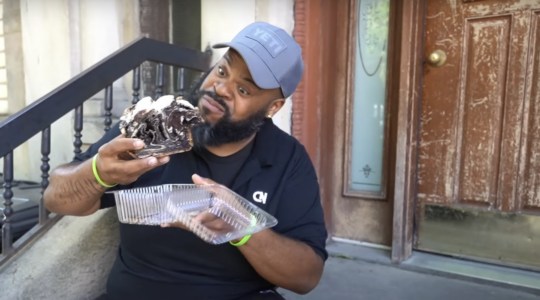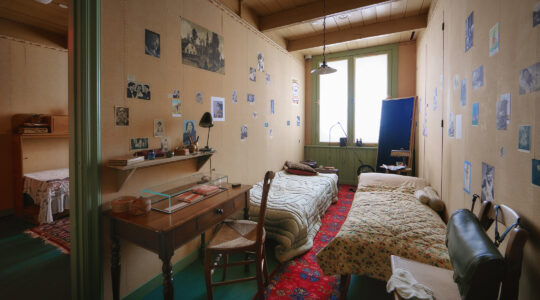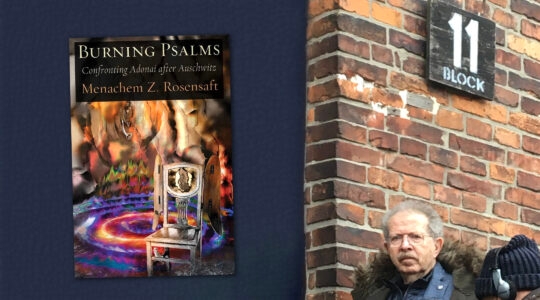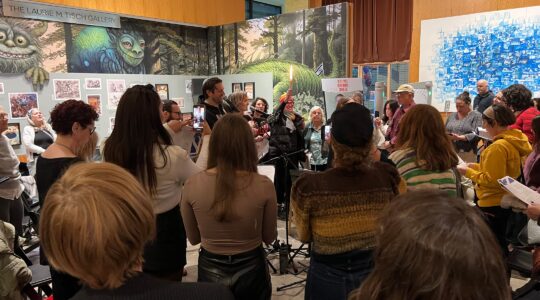The controversy aroused last year by the publication of his latest book, “Defeating Hitler,” and a lengthy interview in one of Israel’s daily papers continues to trail Avram Burg, as suggested by forum here last week.
Sponsored by Dor Chadash, a 5-year-old group that brings together American and Israeli Jews, the April 8 forum drew more than 200 people to a conference room at UJA-Federation of New York, where many of them anticipated a rough-and-tumble evening. And although the tone of the event was much gentler, resembling a cordial discussion rather than a heated argument, Burg showed no signs of backing down from the views he offered a year ago.
In his first New York appearance since the book’s publication in Hebrew last June, Burg told his audience that the Holocaust plays such a dominant and traumatic role in Israeli life that it “nihilates” other moral considerations. If nothing else can compare to the absolute evil of the Holocaust, he continued, it becomes much easier to legitimize many other actions, like the occupation, and to move moral boundaries.
As to the approach he would take, Burg said that rather than set aside a separate day each year to recall the Holocaust, as Israelis do now, they should do so on Tisha b’Av, the day on which Jews commemorate a host of catastrophes. “I don’t believe the Holocaust, as traumatic as it is, requires a different day,” he said.
He suggested, as he has in the past, that Zionism is finished, likening the movement to “a chapter in a book” and referring to it in the past tense. The movement played a role, rescuing Jews and creating a state, said Burg, who once chaired the Jewish Agency for Israel, the quasi-governmental agency responsible for immigration and absorption. But “now that the structure is in place,” he asked, “do we need the scaffolding?”
At other points, he said he would revise Israel’s Law of Return, granting citizenship only to those Jews who need rescue, and he considers aliyah a thing of the past, good for certain individuals, but not for the collective. “I don’t see — and, if you ask me, I don’t want to see — the majority of Jews coming to live in Israel,” Burg added, calling himself happy with the current situation, in which the majority of Jews lead comfortable lives in the world’s democracies.
Burg also said that Israel cannot remain both Jewish and democratic — a situation he believes would lead to apartheid in the face of a growing Arab population — and that most Jews, “including those in this building,” are overly engaged with Israel. As a result of that engagement, Burg believes, Jews are losing sight of their “universal responsibility, of what it means to be a Jew,” and ignoring many of the day’s huge issues, like human rights.
“It’s the first time in human history our contribution is not part of the conversation,” Burg said.
Considering Burg’s family background and the position he, himself, once held in Israel’s political firmament, those views are considered heresy by many Israelis — and not just those on the right.
The son of Yosef Burg, the longtime leader of Israel’s National Religious Party, Burg first drew attention 26 years ago while protesting Israel’s first war in Lebanon. Being both religious and left-wing made him a rarity in Israeli politics, and he quickly rose, serving as an adviser to Labor leader Shimon Peres and winning election to the Knesset in 1988. He took over as the chairman of the Jewish Agency in 1995 and returned to politics in 1999, becoming speaker of the Knesset at the age of 44.
But Burg resigned from the speaker’s post only four years later and, shortly afterward, left politics entirely, entering business.
Burg’s departure from politics and, later, his rejection of Zionism stunned many Israelis, who thought of him as a potential future candidate for prime minister. But nowhere was the sense of betrayal felt more keenly, perhaps, than on Israel’s Zionist left.
Last year’s controversial interview appeared in Haaretz, the liberal daily often referred to as Israel’s New York Times, and was conducted by Ari Shavit, a left-wing journalist who met Burg as both protested the 1982 war in Lebanon. But Shavit argued with Burg during the interview, calling his book “anti-Israeli in the deepest sense.” He also blasted the book’s thesis — that the Holocaust had made Israel a nation of “psychic cripples” — saying that “it’s not as though [Israelis] are living in Iceland” and imagining the threats around them. “We’re one of the most threatened countries in the world,” Shavit told Burg.
A range of others on the left also took issue with Burg, expressing “a familial disgust, or worse, for their wayward brother,” according to an article that appeared last summer in the New Yorker. That story headline: “The Apostate: A Zionist Politician Loses Faith in the Future.”
Eight months later, it appeared that the anger was still raw as Burg prepared to speak to members of Dor Chadash, an apolitical organization that sponsors cultural, educational and social events. In her introductory comments, Tzameret Fuerst, the group’s chairwoman, said that in all her years with Dor Chadash, no event had generated as much controversy beforehand as this one. In an interview later, Fuerst said many people “asked me why we were giving him a platform to speak.”
But the event took place free of the raised voices, hot tempers and raucousness that might have been expected. Part of the reason may have been the format, which included questions from both a moderator, journalist David Kaufman, and members of the audience. Part of it may have been the nature of Dor Chadash, a group that targets young Jews, between 25 and 45, who have grown to expect “a candid, open dialogue,” Fuerst said. And part of it may have been Burg, who adopted a highly personal tone in explaining how his views changed.
Dressed in a dark-blue suit, a light-blue tie and a knitted kipa, Burg said he found himself spiritually adrift during the last few months of his political career. So he spent five weeks hiking the Appalachian Trail, crossing parts of three states and meeting a dozen people, none of them Jewish. By the end of his walk, he said, he realized that something was wrong “with the pace of my life” and that he had to follow other pursuits, including writing.
“For many years, I compromised my inner self,” Burg said, implying that he often played the political game, censoring himself, despite his intense feelings about the occupation, his contempt for the Greater Israel movement and his conviction that Israel had to build a high wall separating “church and state.”
Discussing his book, Burg indicated that much of it was influenced by his parents, both of whom were traumatized by the Holocaust, and by his own question of whether love could overcome trauma. He concluded that it could, he said, telling his listeners that Israelis have to move from trauma to hope and trust.
While he once thought of himself only as an Israeli, Burg said, he now identifies himself as a Jew and a human being, as well as an Israeli. “My love is for the entire human race,” he said — especially for “good people” with values that match his own.
Israel, like any nation, should reflect those values, Burg said. He also believes Israel should be defined not as a Jewish state, but as a state of the Jewish people, and that the role of religious leaders should follow what he calls “the biblical model.”
That model involves defending the helpless and opposing “the maliciousness of the system … rather than being the system itself,” Burg said.
The New York Jewish Week brings you the stories behind the headlines, keeping you connected to Jewish life in New York. Help sustain the reporting you trust by donating today.




